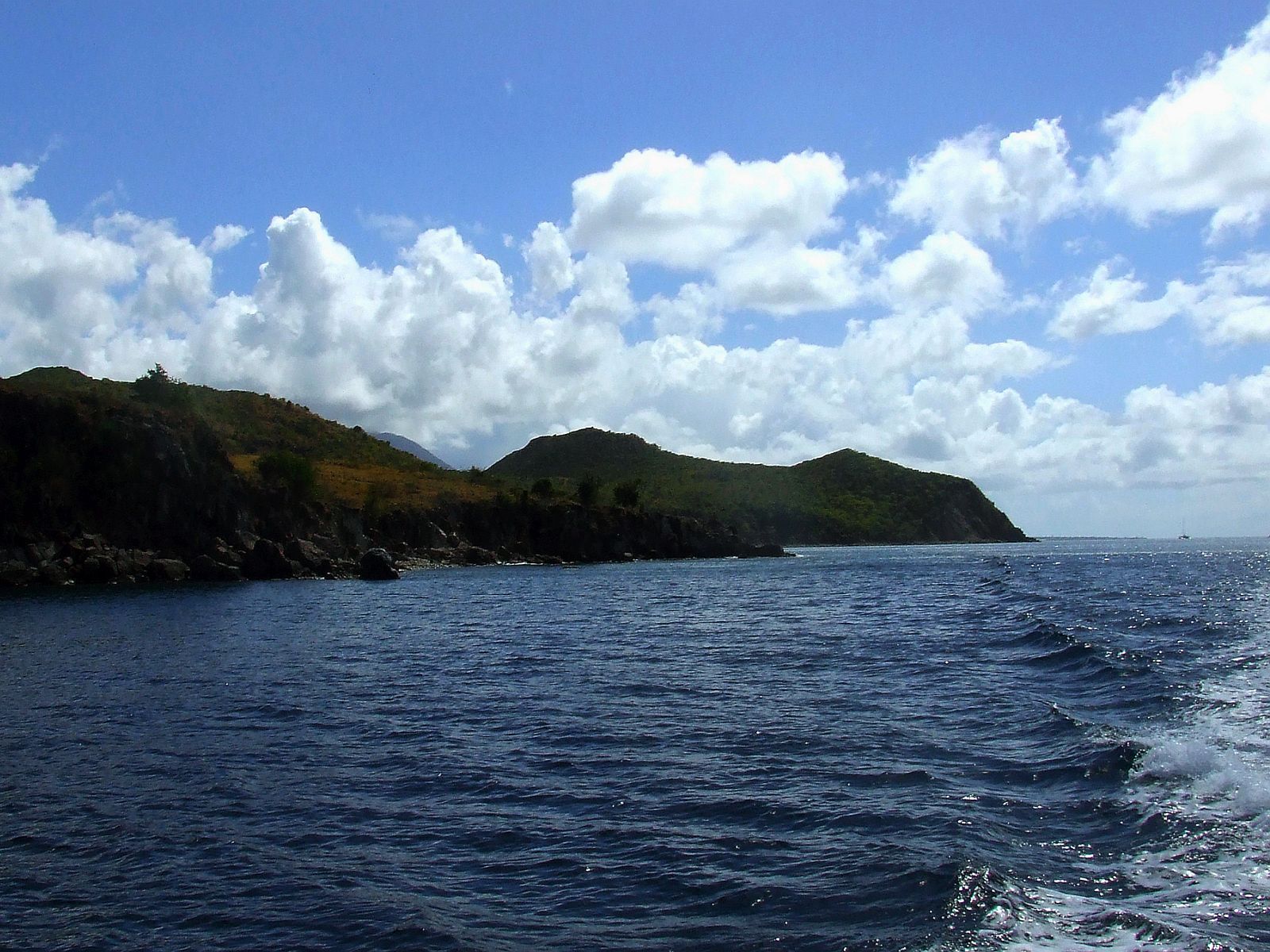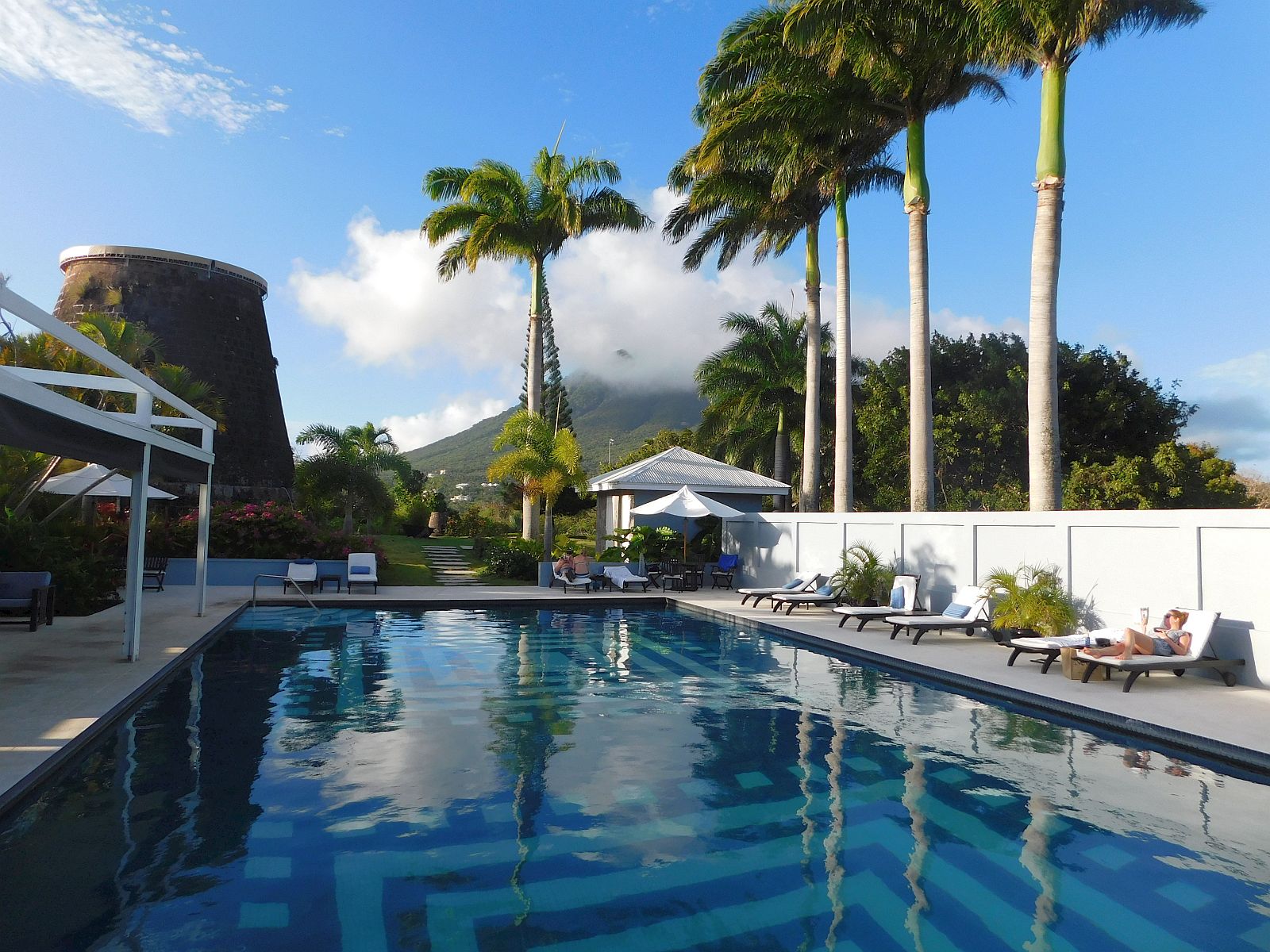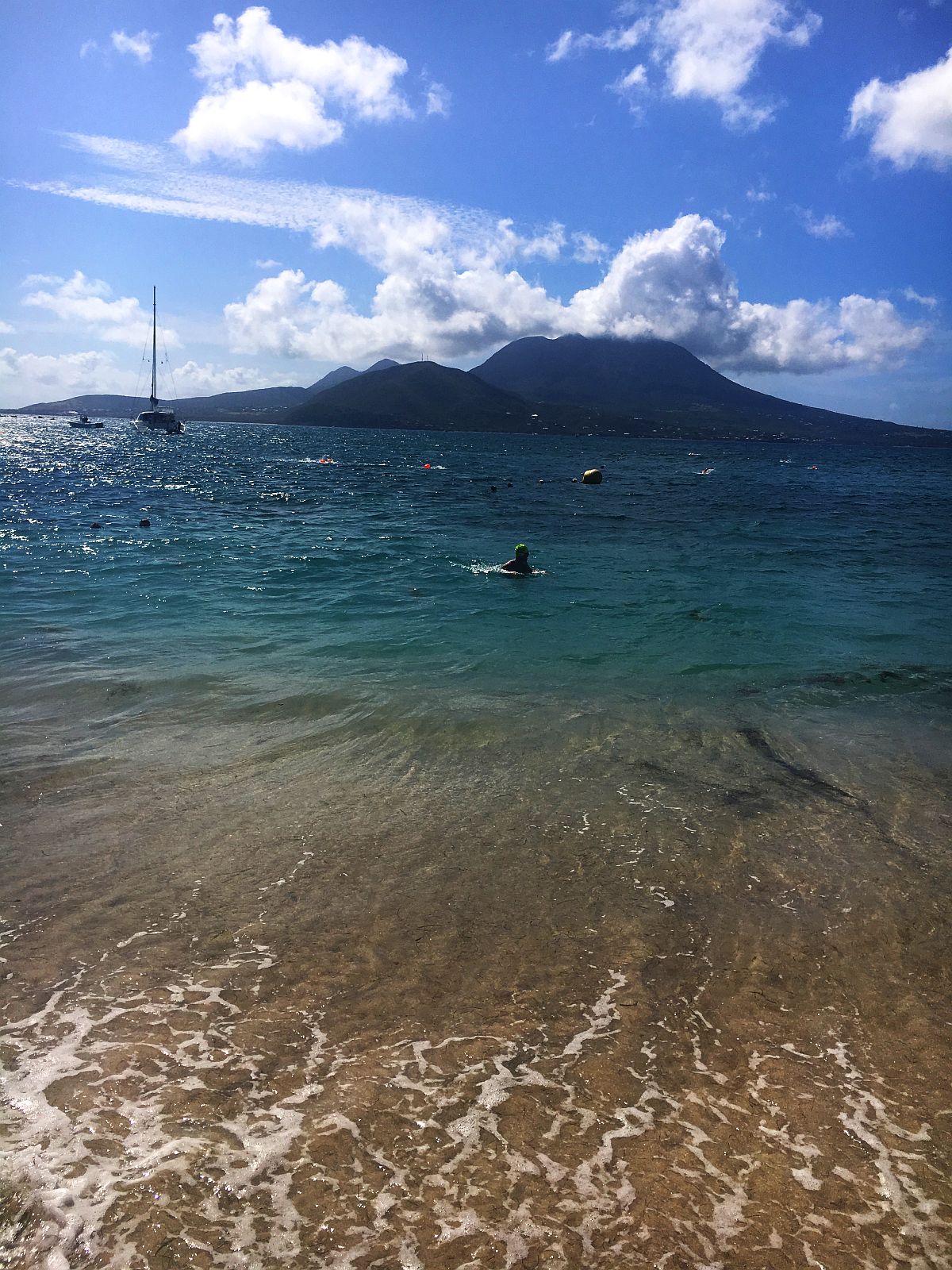The Narrows

A dark shape glided by beneath me, a manta ray, its great wings undulating. It moved with such grace, at such a leisurely pace, I had half a mind to slow down and linger. Meanwhile, on the surface, I thrashed away in the throes of competition — a 55-year-old man somewhere between Nevis and St. Kitts — on the verge of oxygen debt.
It had started innocently enough, the idea to compete in a 2.5-mile, open water swim race while vacationing with my girlfriend in the West Indies. I gave myself six months to prepare, joined a Masters swim group, woke at five most mornings to work out and averaged twelve miles a week.
I spent my free time watching swimming videos and fell asleep at night reading articles on stroke mechanics. I wasn’t coming to this new, I should point out. I had been a serious swimmer in my thirties (nationally ranked at two miles) but hadn’t trained in close to 20 years. Why, after all this time, the sudden desire to race? Well, along with my recent career change and divorce, chalk it up to a midlife crisis.
A month before the race I came down with the flu, which a week later turned into pneumonia. Then, just as I was beginning to feel normal again, I succumbed to food poisoning. All told, I missed three weeks of training and was left with only a week to prepare before the race.
My girlfriend, Cathy, and I departed as planned. My hope was that I might still have some residual fitness left. As our little prop-plane made its approach to Nevis, I looked down upon the rolling whitecaps of the channel between Nevis and St. Kitts — the very water I would cross in a few days — and felt my stomach churn with anxiety.
We stayed at the Montpelier Plantation on Nevis, a 300-year-old sugar plantation converted into a resort, situated high up on the crest of a hill with views of the Caribbean on one side and the island’s towering volcano on the other. The resort positively thronged with vegetation: vast groves of palm trees, pathways arced by giant ferns, luxuriantly petaled flowers. We fell asleep to the braying of donkeys, woke to the chatter of monkeys and the cries of exotic birds.
Secluded and colonial-chic, the resort felt like a British rock star’s retreat, with independent cottages, two gourmet restaurants, yoga classes, a 20-meter lap pool and a private beach. At night, an eccentric mix gathered by the bar: a hedge fund retiree with his much younger wife; a vaguely famous New York actor and his family (“Wasn’t he in the movie Chef?”); a pair from England itching to swap partners and a silver-haired couple from Hyannisport, draped in cashmere and Kennedy ideals.

The event, the annual Bente Weber Memorial Cross Channel Swim, has become one of the premier open water races on the planet (part of the Global Swim Series), attracting elite swimmers from around the world. It started in 2002 as a way of remembering a local swimmer who died of cancer. In more recent years, however, it has morphed into a means of raising awareness for the plight of the local sea turtle population.
230 swimmers signed up, including three former Olympians: American Ashley Whitney, gold medalist in Atlanta (4×200 freestyle relay); Britons Keri-Anne Payne, silver medalist in Beijing (10km); and Greg Whyte. Needless to say, this meant that the first three spots were spoken for. My irrational goal was to finish in the top ten.
Between the two islands, the Caribbean (to the west) and the Atlantic (to the east) meet like two vying forces, guaranteed to create rough water. When she heard I was doing the race, the resort’s owner smiled and said, “Well, let’s hope it’s not like last year. We wouldn’t want you to end up in Nicaragua.” Apparently, a number of swimmers dropped out in 2016, floundering in the giant swells, pushed woefully off course.
The morning of the race, a mob of swimmers and spectators descended upon Oualie Beach, a frenetic buzz in the air. I spotted Greg Whyte being interviewed by a local TV news reporter, the camera trained on his physique. I had never seen a body so defined, every muscle worked within an inch of its life. To say I felt intimidated would be an understatement. When he turned, I saw the five Olympic rings tattooed on his back.
My ever-thoughtful and practical girlfriend lathered my back with sunblock. “Do you know where you’re going?” she asked.
I smiled and motioned vaguely to the north, toward three jagged peaks, the only visible landmarks on St. Kitts. “Don’t worry,” I said, “I’ll just follow the lead swimmers.”
She looked dubious. “Didn’t you hear the instructions?”
“They said something about navigating by one of the peaks.”
“Which one?”
I shrugged (a moment that would come to haunt me). “I’m sure there’ll be boats or buoys out there . . .”
The field lined up on the immaculate white sand. The water looked calm, waves no higher than our knees. I adjusted my goggles, reminded myself to go out slower than I wanted. The countdown resounded over the bullhorn, and then, before I could assimilate what I was about to do, the pistol fired.
I ran, legs splayed, into the surf, and knifed through the cerulean depth, jockeying to find clear water and the truest line. Concentrating on my form, I embarked, exerting all my effort to be effortless. Every half-dozen strokes or so, I lifted my head to sight. Very soon, I found myself separated from the field, the utter vastness of the sea upon me, while, to the east, I could see where the lead swimmers surged ahead, forming a splashing furrow of white.
I knew I was missing an opportunity: by drafting off the heels of another swimmer I could save up to 25% of my energy. But I stayed to my line, relishing being out of the fray, keeping to my own rhythm. The water was smooth, just a slight westward swell. Not wanting to lose contact with the leaders, I put my head down and picked up the pace. The visibility was startling: 50 feet down I could see bright orange starfish scattered across the sea floor and, now and then, a turtle or manta ray or school of technicolor fish.

As I neared the center of the channel, known as “the Narrows,” the water turned rough — big cresting waves rolling east to west — throwing off my stroke. For moments, I found myself hanging in midair with nothing to sink my hands into before plunging down the face of the wave. Demoralized, I plowed on, certain my race had gone off the rails. Then, just as I got used to the swells, they abruptly changed, coming at me from all directions.
I lifted my head and saw what looked like a reef or rock wall blocking my way. No one mentioned this before the race! The surf crashed against the rocks, then swept back, leaving me suspended, as if in a washing machine. I spotted another swimmer in front of me who had found himself at the same impasse. Which way? I thought. Just then, east of the rocks, two West Indians in a small motorboat cried out something unintelligible, motioning with their arms to go the other way. My competitor and I dug in, surging around the wall. After five hard minutes, I pushed past him and kept up the momentum. When I finally rolled onto my back to see where he was, he was nowhere to be found.
But then, as I looked around, I realized there was nothing in sight, not a boat or buoy or another living soul. Wherever I turned, I saw nothing but an endless expanse of heaving sea, and it all looked the same. The water was deep here, petrol blue beneath my feet, and I felt like some small, defenseless prey. The waves lashed, buffeted against me, lifting then dropping me a full story. For some moments, I had no idea where to go and began to panic. Where were the other swimmers? Had the current pushed me so far off course? And where in God’s name was the shoreline?
And then it hit me: I was alone — utterly and horrifyingly alone.
As each wave launched me into the air, I spun around, frantically looking for land. I saw nothing but palettes of blue and light dancing everywhere. At last, the three peaks appeared, but now, from this vantage point, they were not grouped close together but far apart. Maybe half a mile separated each peak. So, which was the finish line? I thought back to the pre-race meeting and cursed myself for not listening. Spontaneously, like a good former Buddhist, I chose the middle way.
I set out at a frenetic pace, trying to salvage what remained of my race. As my form deteriorated, I found myself throwing my arms at the water. Then, to make matters worse, I sensed a new current coursing down the coast of St. Kitts, coming straight at me. I was still a good half-mile from shore when, out of the depths, the sea floor rose up like a revelation. The water felt velvety and thick, and it seemed the same starfish lingered beneath me stroke after stroke.
Still uncertain if I was even on course, I kept lifting my face to scan the horizon. But what should I find beyond an olive-colored backdrop? The water grew shallower by the minute. A continuous flow of sea life passed beneath me: more turtles, a barracuda, a wall of neon yellow angelfish. And then, as I raised my head, I spotted an arch, a brilliant white arch, strewn with flags, rising above the beach—the finish line. By dumb luck, I had found it.
Such a short distance remained, maybe two or three football fields, but it seemed to take forever to cross, like swimming upstream. The moment my hand touched sand, I climbed to my feet, collapsed, got up again, and bounded through the archway looking, as Cathy later put it, “like a lumbering ape.”
“Where did I finish?” I asked, the first thing out of my mouth as Cathy hugged me.
“Thirteenth,” she said. The winner had finished twelve minutes ahead of me and set a new course record (55:28). As expected, the first three spots went to the Olympians: Ashley Whitney (1st), Greg Whyte (2nd) and Keri-Anne Payne (3rd). I felt exhausted but elated, and recognized, for the first time that day, that my back was scorched from the sun. I might have missed the top ten, but I was just grateful to have made it as I thought back to the Narrows and my sense of being lost out there. All at once, I felt suffused with the kind of satisfaction that comes after conquering what you fear. And I wanted to do it again.
After collecting my age group award (a nine-inch sculpture of a sea turtle), I joined Cathy at the crowded Reggae Beach Bar on Cockleshell Beach, where she sat next to a tall, exceedingly fit young woman in a bathing suit with shoulder-length black hair.
“But you look so relaxed . . .” Cathy said to the woman. “You don’t look like someone who just swam a race.”
The woman smiled and shrugged. “I swim a lot.”
Cathy turned to me. “Jay, this is Keri-Anne from England.”
We said hello and shook hands, when it dawned on me: this was Keri-Anne Payne, two-time World Champion, Olympic silver medalist, one of the greatest marathon swimmers on the planet. As I struggled, dumbstruck, to formulate a sentence, she stood and said, “Well, I should be going . . .”
“Where?” We asked.
“Nevis,” she said. She was heading back to escort the Special Olympics’ swimmers across. Then she put on her swim cap and goggles and started for the sea.

 Jay Hoy Kauffmann teaches Literature and Creative Writing at the Miller School of Albemarle and Writer House in Charlottesville, Virginia. Winner of the Andrew Grossbardt Memorial Prize and nominee for a Pushcart Prize, his fiction, essays and travel pieces have appeared in Lumina, Upstreet, CutBank, Gulf Stream, Prime Number, Storyglossia, Mid-American Review and many other journals and anthologies.
Jay Hoy Kauffmann teaches Literature and Creative Writing at the Miller School of Albemarle and Writer House in Charlottesville, Virginia. Winner of the Andrew Grossbardt Memorial Prize and nominee for a Pushcart Prize, his fiction, essays and travel pieces have appeared in Lumina, Upstreet, CutBank, Gulf Stream, Prime Number, Storyglossia, Mid-American Review and many other journals and anthologies.
